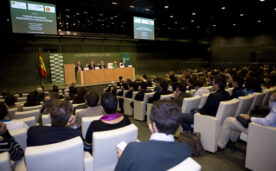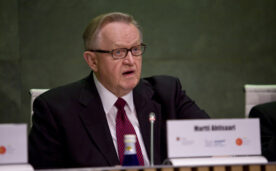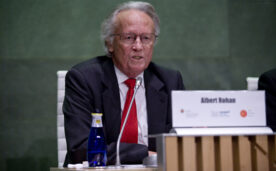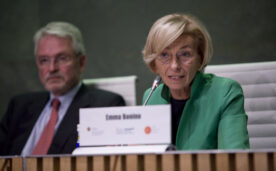The Rafael del Pino Foundation hosted the debate entitled "Turkey in Europe. Breaking the vicious circle" on 5 November 2009. This debate analysed the current situation of the accession process, the danger of "Islamisation" of Turkish society, the Kurdish and Cypriot problems and the differences with Armenia, among other issues. The event was organised by the Rafael del Pino Foundation, the University Institute of European Studies of the San Pablo CEU University and the Elcano Royal Institute.
The debate, moderated by the Director of the Rafael del Pino Foundation, Amadeo Petitbò, was led by Martti Ahtisaari, President of the Independent Commission on Turkey and 2008 Nobel Peace Prize winner; the Vice-President of the Italian Senate, former Italian Minister for International Trade and European Affairs and former European Commissioner, Emma Bonino; the former Minister of Foreign Affairs, former Secretary General of the Council of Europe and former European Commissioner, Marcelino Oreja; and the former Austrian Secretary General for Foreign Affairs, Albert Rohan.
Martti Ahtisaari said: "The important thing is that [Turkey] has to be treated like any candidate. We have to continue the negotiation process through its 35 chapters and at the end see the outcome of the process. Turkey also has a very important role for economic and political reasons, and acts as a gateway to the region. Turkey would be a very positive addition for the European Union.
Regarding the rejection of Turkey's EU membership, Marti Ahtisaari said, "There is not only opposition in some European quarters. There is also weariness in Turkey because there is a feeling that the current EU members do not want Turkey in the EU. And this is very dangerous".
Marcelino Oreja said that "the problems arise from the great enlargement [of the European Union], even though we are talking about countries that are unequivocally European. [Turkey is a controversial case because, firstly, there is talk of Islamism, although it is a secular state, and secondly, because of the number of its inhabitants. Turkey now has 70 million inhabitants and may reach 90 or 100 in a relatively short period of time. But these are not reasons not to open a process. If the criteria are met, there is no reason why Turkey should ever be considered a European country.







